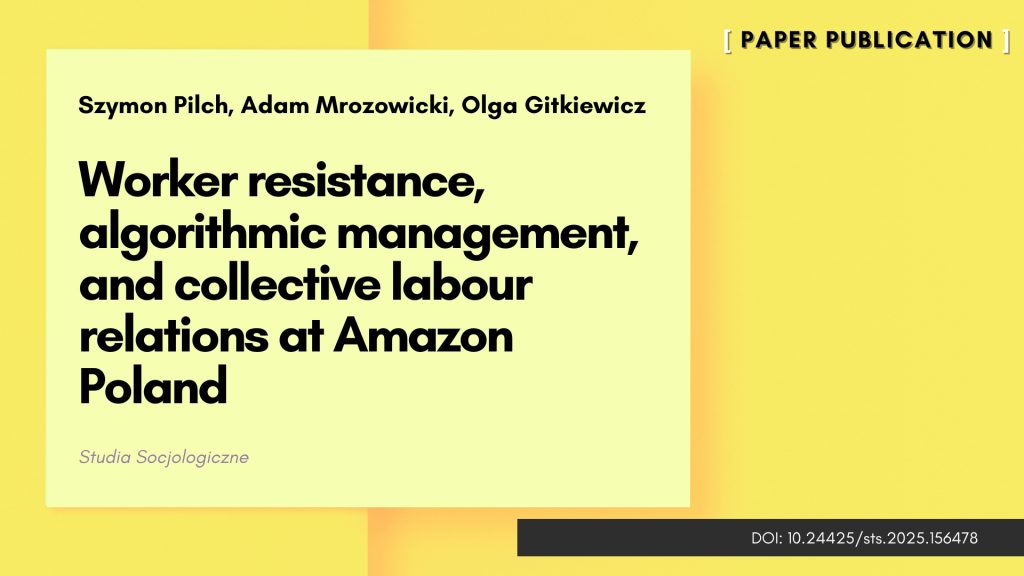
[PAPER PUBLICATION] Worker resistance, algorithmic management, and collective labour relations at Amazon Poland
Szymon Pilch, Adam Mrozowicki and Olga Gitkiewicz, INCA researchers from the University of Wrocław, have published a paper entitled “Opór pracowniczy, zarządzanie algorytmiczne i zbiorowe stosunki pracy w Amazon Polska” (in english: Worker resistance, algorithmic management, and collective labour relations at Amazon Poland) in the journal Studia Socjologiczne.
The aim of this article is to analyse forms of workers resistance at Amazon Poland. Amazon is one of the key players in platform capitalism. The company’s management model, combining digital collective labour relations and algorithmic control over work, has a negative impact on collective labour relations throughout the supply chain. Digital Taylorism is compounded by the spread of Amazon’s business model based on temporary work and subcontracting, which is referred to in academic research as the ‘platform effect’. Amazon, due to its position as a very large, global and influential employer, is a privileged subject of research into new forms of control and resistance in the context of digitalisation, with significant potential to impact other industries and national labour relations.
Existing research on Amazon focuses on issues of technological, economic and hegemonic control of employees, both through digital tools and relatively better employment conditions than those offered by competitors, as well as a specific corporate culture combining ideologies of community and individual competition. Others consider the limitations and possibilities of collective resistance within traditional and new trade unions. Referring to earlier analyses of the labour process at the company, the authors analysed empirical data from 30 biographical, in-depth and expert interviews with Amazon Poland employees, trade union leaders and employer representatives. The research complements the existing literature on the subject by highlighting the importance of everyday and less obvious practices of resistance, which are carried out by both warehouse workers and subcontractors and fall between two continua of contestation (overt vs. covert and individual vs. collective).
In practice, employees are increasingly using digital tools to criticise working conditions on social media and organise strike referendums using online platforms. They also resort to a repertoire of analogue resistance tactics that have been known for decades, such as individual and collective slowing down of work, abandoning work, scheming and outsmarting control mechanisms by colluding with leaders, and in extreme cases, theft of property. The company’s tolerance of such practices suggests that they are largely harmless to its business objectives.
The authors argue that the hybrid nature of employee resistance in the company, combining hidden practices (individual and collective) with innovative trade union tactics and strategies, reflects not only the structural and institutional limitations of more conventional, overt and collective forms of contestation, such as collective bargaining and strikes. It also fits into and is reinforced by the heterogeneous institutional order of patchwork capitalism, in which informal actions based on everyday resourcefulness and improvisation are crucial.
In addition, the work makes a new contribution to the literature on trade union strategies and tactics, showing that a context unfavorable to trade union activity can foster organisational innovation on the part of motivated leaders. These innovations allow trade unions to extend their influence to new areas of the Amazon ecosystem, such as temporary employment agencies and subcontracting companies, creating the potential to contest the platform effect.
Share on Facebook Share on Twitter Share on Pinterest